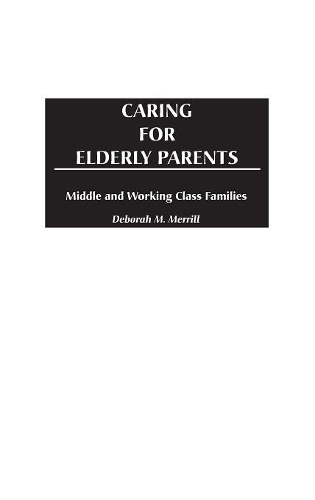
Caring for Elderly Parents: Juggling Work, Family, and Caregiving in Middle and Working Class Families
(Hardback)
Publishing Details
Caring for Elderly Parents: Juggling Work, Family, and Caregiving in Middle and Working Class Families
By (Author) Deborah M. Merrill
Bloomsbury Publishing PLC
Praeger Publishers Inc
30th May 1997
United States
Classifications
Tertiary Education
Non Fiction
Welfare and benefit systems
Sociology: family, kinship and relationships
Geriatric medicine
362.82
Physical Properties
Hardback
244
Description
Based on open-ended interviews with adult children and children-in-law, this book documents how plain folk from the working and middle classes manage to provide care for their frail, elderly parents while simultaneously meeting the obligations of their jobs and their own immediate families. Adult children who care for elderly parents are pressured daily trying to juggle the responsibilities of work, family, and caregiving. Deborah Merrill shows how plain folk (as one caregiver termed herself) from the working and lower middle classes manage to provide care for their frail, elderly parents while simultaneously meeting the obligations of their jobs and their own immediate families. The evidence is drawn from open-ended, in-depth interviews with adult children and children-in-law, all of whom have worked outside of the home at some point during caregiving. Merrill examines the strategies that caregivers use to combine work and caregiving and the accommodations they make in their jobs. She also points to the pathways that lead family members to caregiving roles and how those pathways vary according to family history, gender, and in-law status. By focusing on class differences in caregiving and pointing to policy implications, Merrill has provided an invaluable resource for students, researchers, and policymakers in social work, gerontology, family studies, and social issues.
Reviews
"[This book] will generate creative research, but even more, it will stimulate lively discussions among students, as those who have experienced such challenges in the lives of their parents and grandparents are encouraged to contribute their own stories, and those who had thought such transitions would occur smoothly, or had never thought about them at all, have their eyes opened and begin to think about policies that could help."-Frances K. Goldscheider University Professor and Professor of Sociology Brown University
"This original study of working class adults who care for elderly parents contributes in three ways to the growing interest, theoretical as well as practical, in the interdependence between individual lives and social structures. Its illustrations of caring institutions suggest revisions essential if the changing needs of the growing numbers of frail elderly are to be met; its focus on caregivers confirms, with lavish and dramatic examples, the realities of the competing demands of work and family; and its cautious analysis of the data clearly demands the attention of policy makers."-Matilda White Riley, D.Sc. Senior Social Scientist National Institute on Aging
Delving into why children care for elderly parents despite their other responsibilities, and how they manage, Merrill relates caregiving to prior experiences (using life course theory) and to other roles.... Perhaps her most important point is that stress is reduced when caregivers feel mastery of their role.-Choice
"Delving into why children care for elderly parents despite their other responsibilities, and how they manage, Merrill relates caregiving to prior experiences (using life course theory) and to other roles.... Perhaps her most important point is that stress is reduced when caregivers feel mastery of their role."-Choice
Author Bio
DEBORAH M. MERRILL is Assistant Professor of Sociology at Clark University. Over the past several years she has published articles in both gerontology and family studies.
